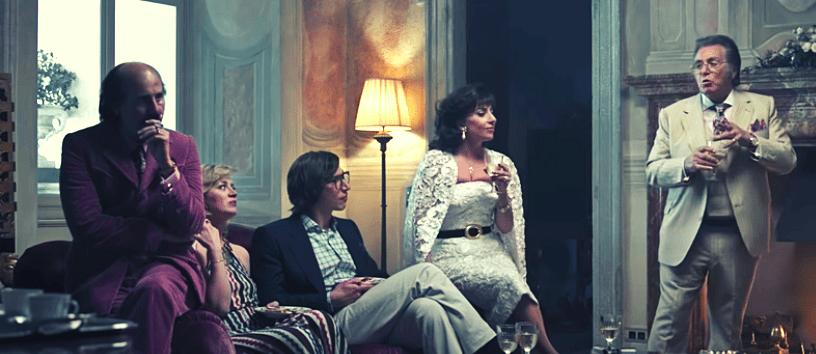House of Gucci, directed by Ridley Scott, is a chronological sweep of a renowned fashion empire, but it starts with a love story.
The year is 1970, the city, Milan. Patrizia (Lady Gaga), a young woman assisting her father in his transportation business, meets Maurizio (Adam Driver), the scion of the Gucci brand, at a party. It is not love at first sight — it cannot be — because a universe separates the two. Patrizia seems eager, even pushy, hoping for sparks to fly: She asks Maurizio for a dance; scribbles her number on his scooter so he can ask her out; makes the first move to iron out any incipient wrinkles in his mind. Patrizia wants it all, and she wants it now – she is 22.
Patrizia and Maurizio are like the sun and the moon. She bristles with energy, radiance, and blaze. To be in her company is to recognise the vast possibilities of life. Maurizio is calm and reserved. Warm familiarity and faux modesty come easy to him. She flaunts; he deflects.
They live under the same sky yet are not destined to meet.
Gaga and Driver are excellent picks for these roles. Her natural anxiety and performative confidence, her hunger and desperation, are so real that you can smell and touch them. No matter who else is in the frame, or what is going on, if Gaga is on screen, everything else dissolves. And Adam Driver tests the limits of being Adam Driver: transcending all possible notions of charm and suave, eight days a week. The guy could have sold designer masks in a pre-COVID world.

Adam Driver in a still from Ridley Scott’s ‘House of Gucci’.
The 158-minute drama, to no one’s surprise, likes to take its time. In the first 30 minutes, for example, the story strolls, then wanders: The couple meet multiple times, fall in love, outsize parental opposition, and marry. These scenes are marked by impressive life-like rhythm, but even such a relaxed screenplay (by Becky Johnston and Roberto Bentivegna) keeps leaving crucial gaps. The romantic subplot, as a result, struggles to relay the weight of the relationship. We never quite get what makes Patrizia and Maurizio fall for each other.
We don’t quite get their characters, either. Is Patrizia opportunistic or a hopeless romantic? What makes Maurizio so distant from his father and the family business? The screenplay devotes considerable time in establishing mood and foundation but rushes the transitions (the reasons for their union and defiance, to the extent that the young Gucci is willing to antagonise his father). If Gaga and Driver’s performances wouldn’t have mitigated such flaws, the opening chapter would have been a big misfire.
But this problem, along with a distinct lack of focus, persists throughout the film. Even when the drama introduces new characters of the Gucci empire – such as Aldo (Al Pacino), Maurizio’s uncle, the chairman of the fashion brand; Paolo (Jared Leto), Aldo’s talentless son; Domenico (Jack Huston), Maurizio’s trusted aide – it craves a cohesive force that unites different people and conflicts.

A still from Ridley Scott’s ‘House of Gucci’.
The main question, even after an hour, remains unresolved: What are we watching? Is it the story of a ruthless young woman pitting one family member against the other for personal gains? Is it the story of a once naïve man (Maurizio) lured by the vicious tentacles of wealth? Is it about a family, so restless to conquer the world, that it got consumed by the world itself?
Maybe it’s all of these.
But House of Gucci doesn’t follow its promises – and we’re often unsure what it’s promising. We of course don’t want to be spoon-fed information, but some hints – such as shades of subtle transformations and sharp writing directing our attention – would have made the film much more compelling.
House of Gucci is more interested in the destination than the journey, even though it has no dearth of the latter. So, far too often the conclusion of a subplot feels surprising – at times shocking. Take Maurizio’s infidelity or divorce. Or Domenico’s true motives. Or Patrizia’s drastic change of heart – and several others. If the makers intended to veil the characters’ intentions to build intrigue and spring surprise, then it doesn’t work. If the makers wanted to depict the swirl of confusion in a family of backstabbers, then it needed more finesse.

A still from Ridley Scott’s ‘House of Gucci’.
Even the long passage of time – the movie spans more than two decades – doesn’t feel organic. Sometimes the temporal change doesn’t register at all; our only clue is Patrizia and Maurizio’s growing daughter, Alessandra. Some other characters and relationships lack texture.
Aldo keeps calling Paolo an “idiot”, but is there more to their relationship than open hostility (two scenes hint at a more complex bond but don’t settle on anything definitive)? Paolo is a constant punching bag – and again, except for one scene, you wonder, ‘Is there nothing more to him?’
Ditto the relationship between Domenico and Maurizio. House of Gucci glows whenever it returns to Patrizia: the freewheeling moth so addicted to flame that she wanted to burn the sky. But like her, the movie’s executions and ambitions are not in sync.
This article was first published on The Wire.
Featured image: A still from Ridley Scott’s House of Gucci.

